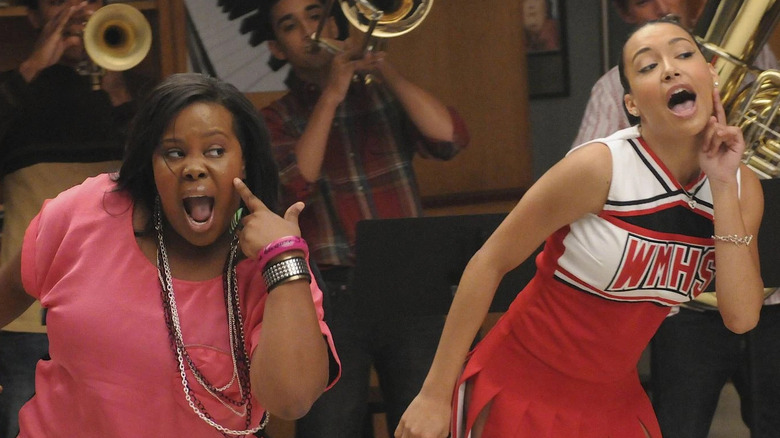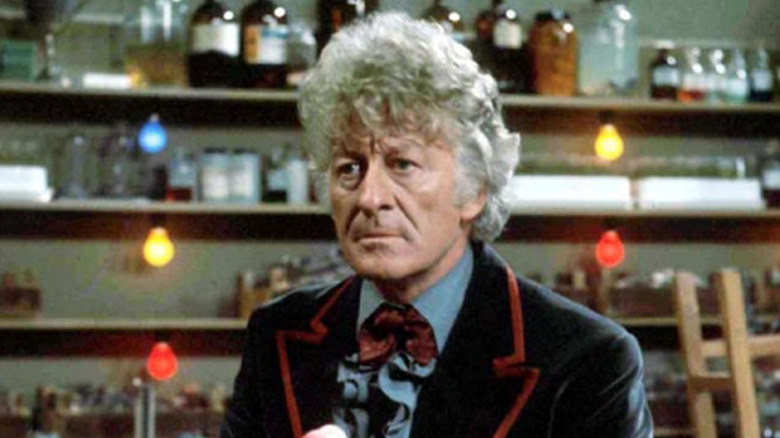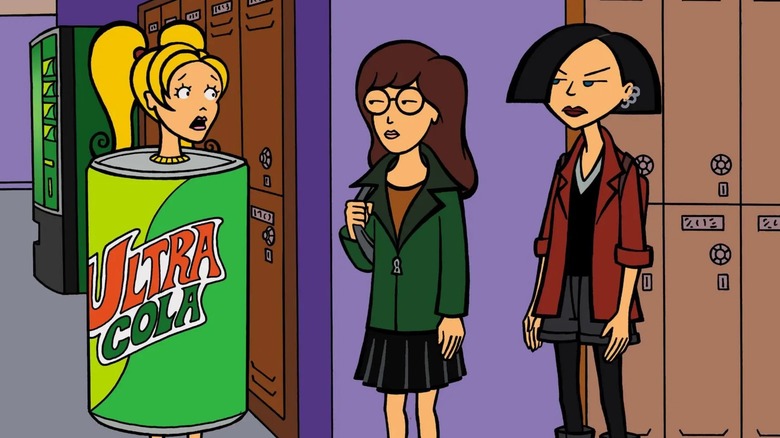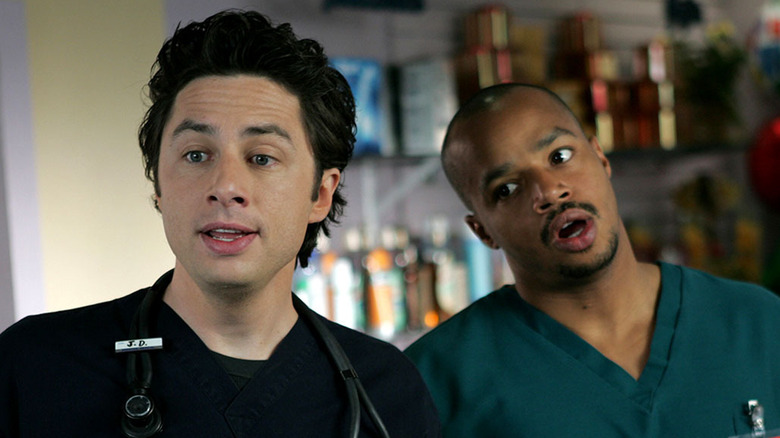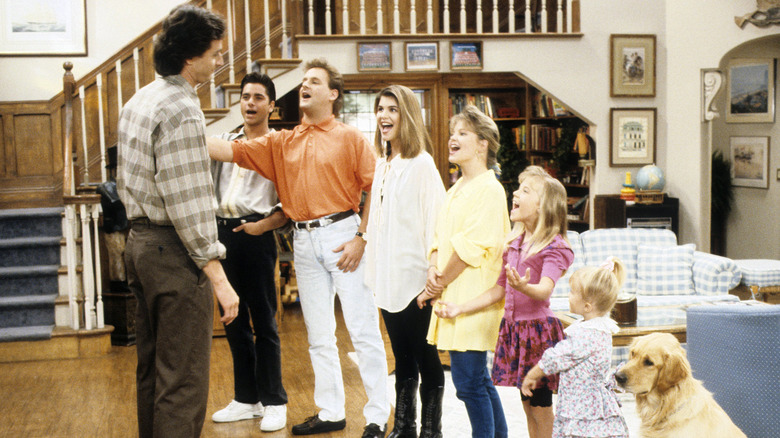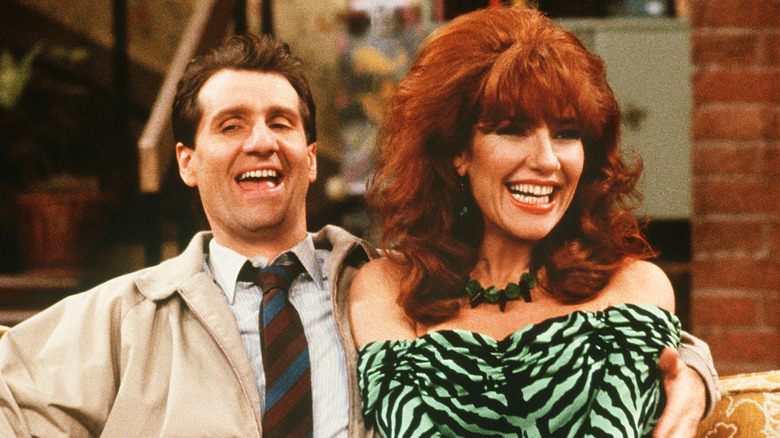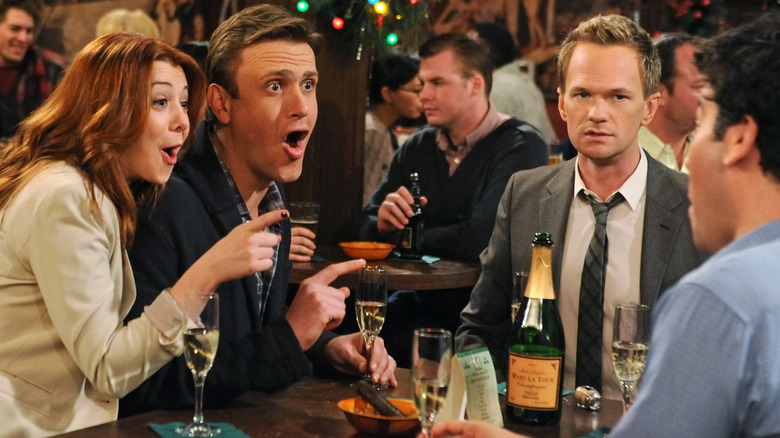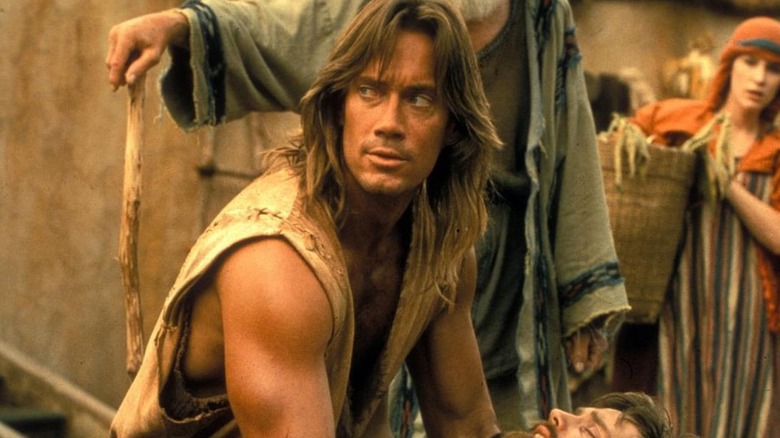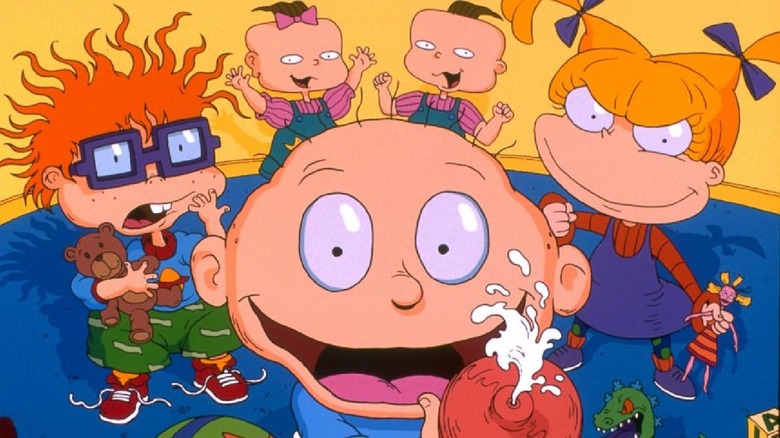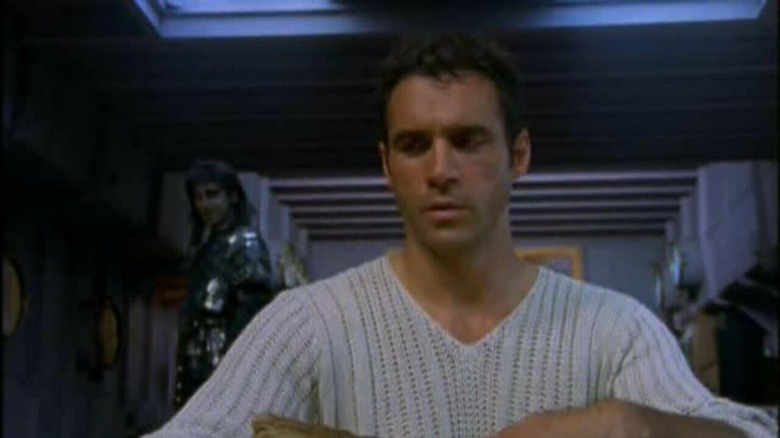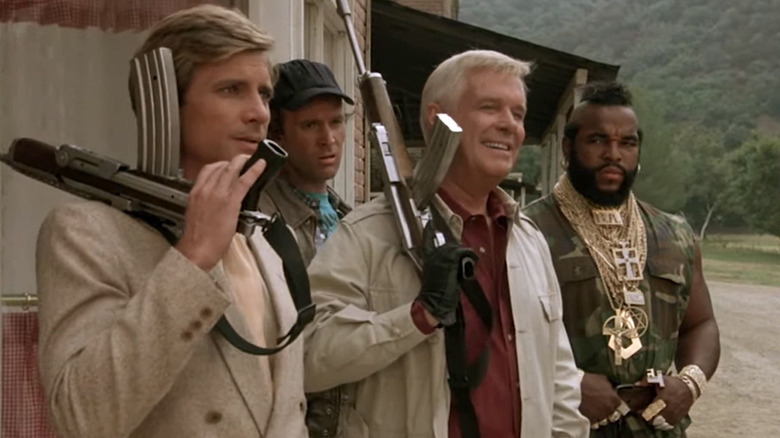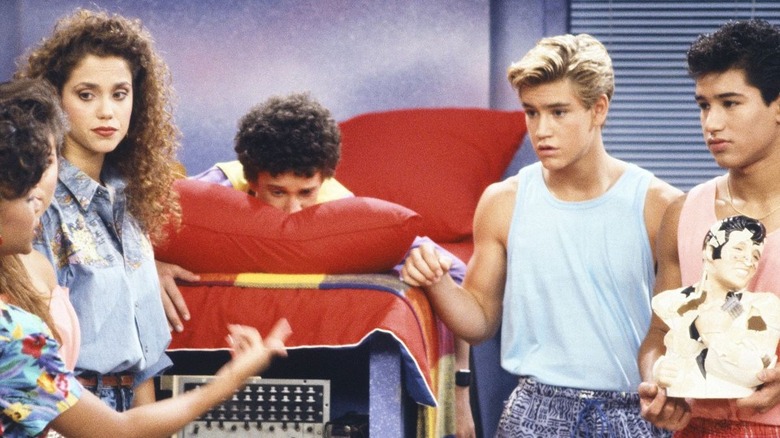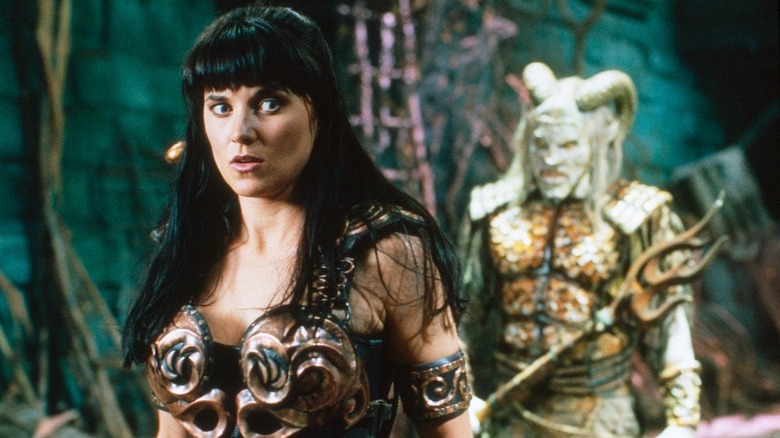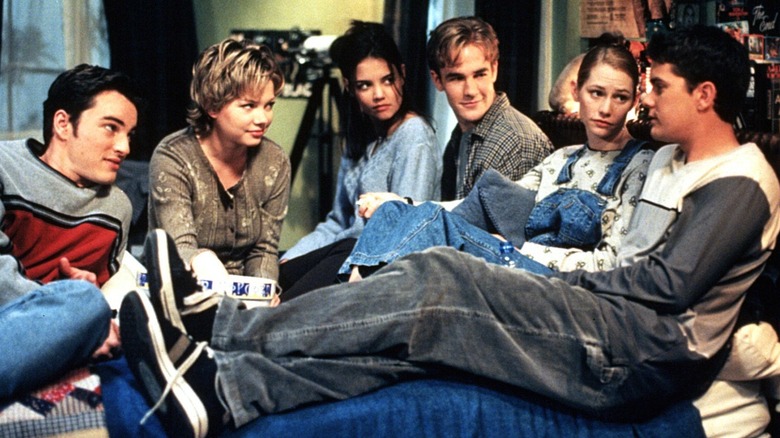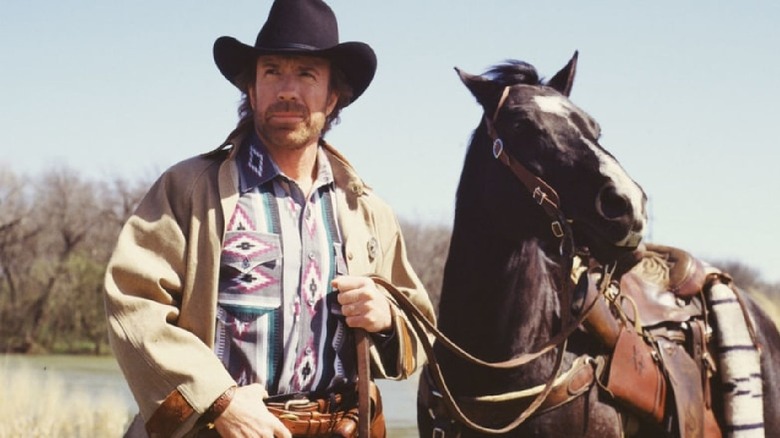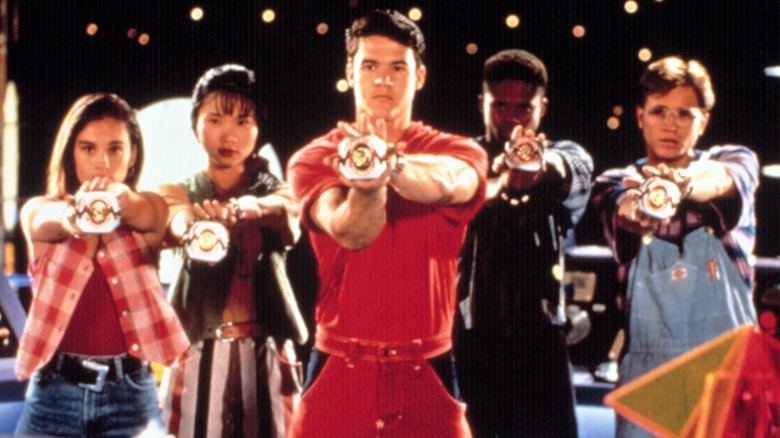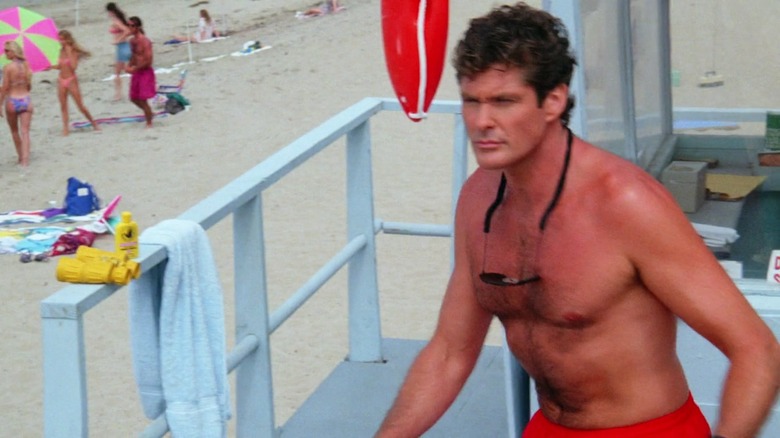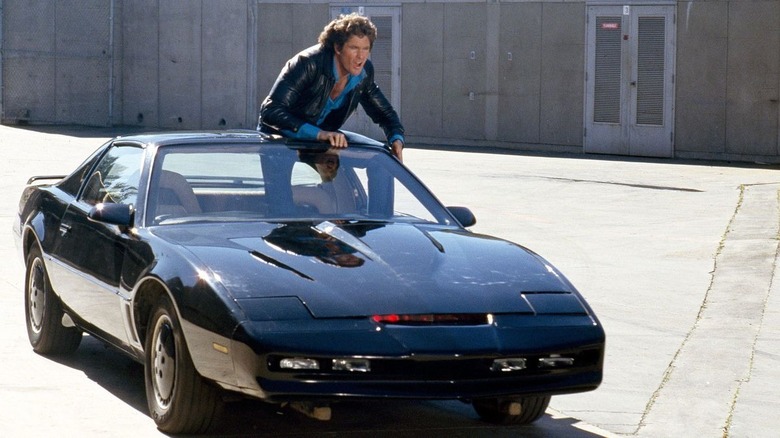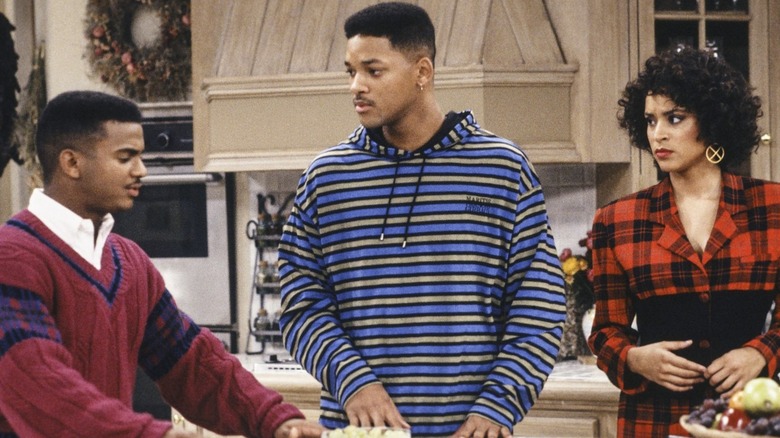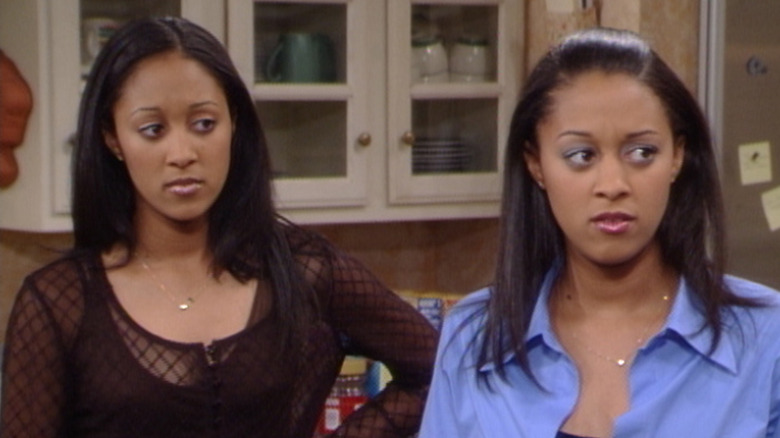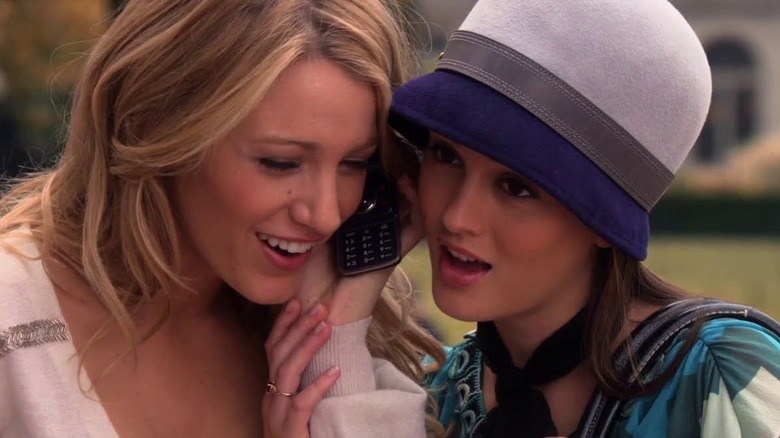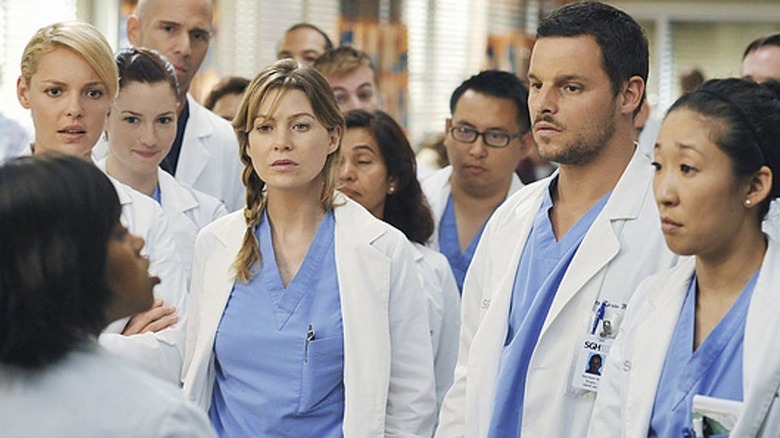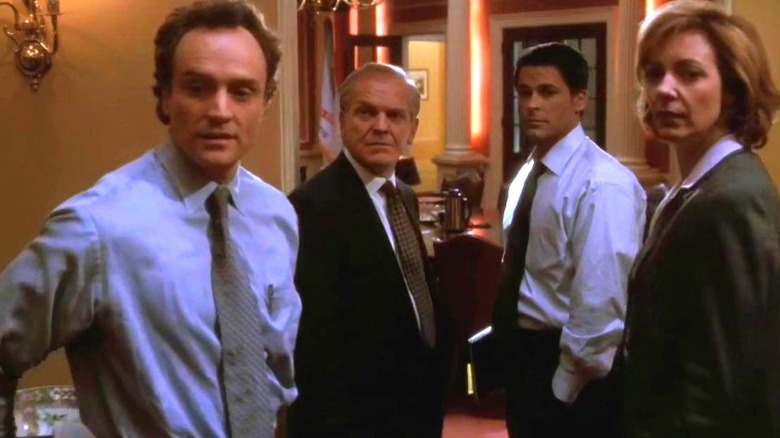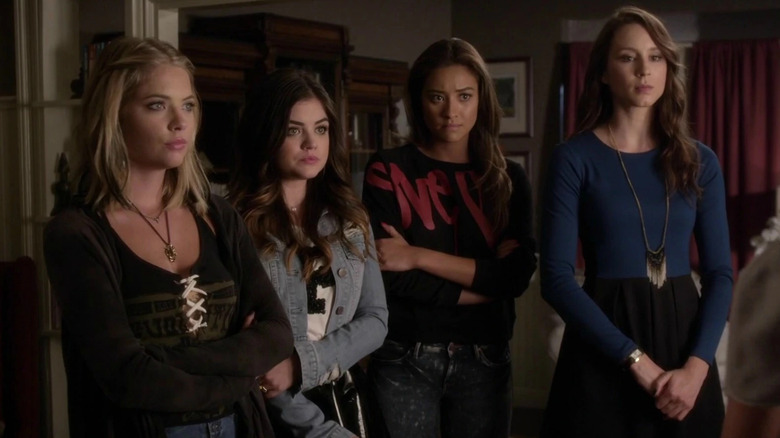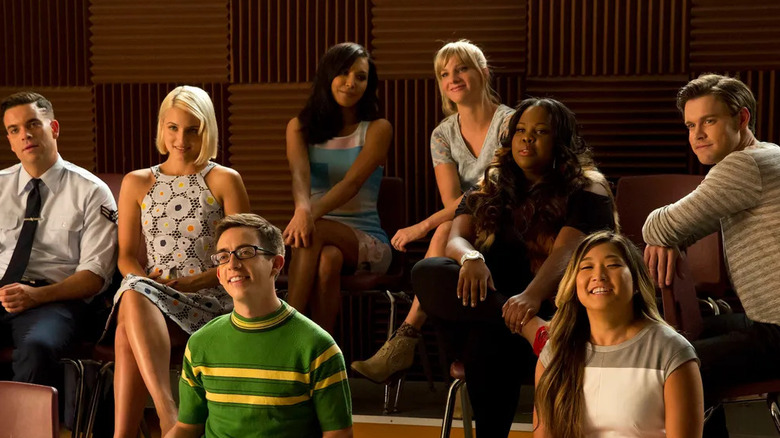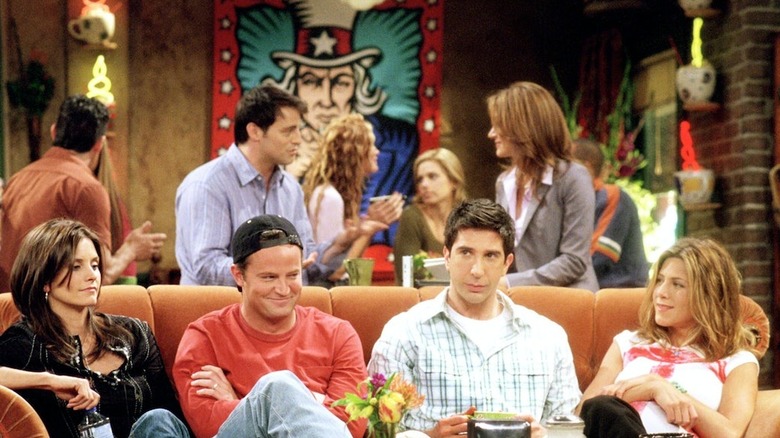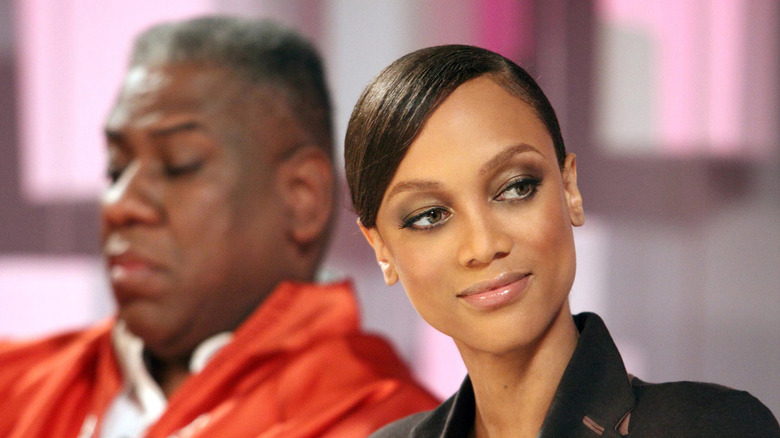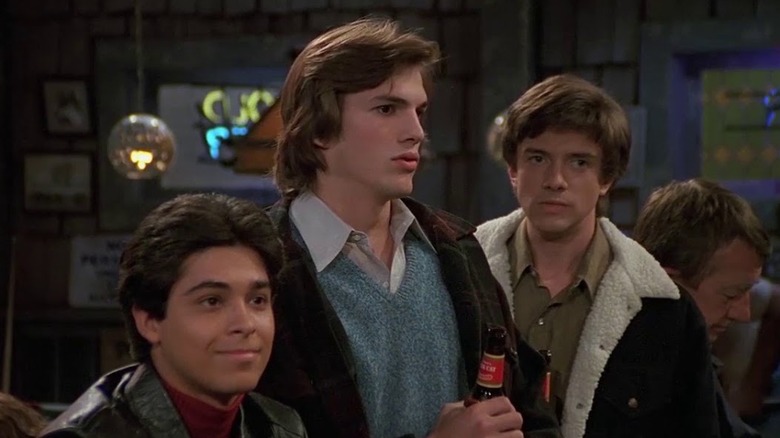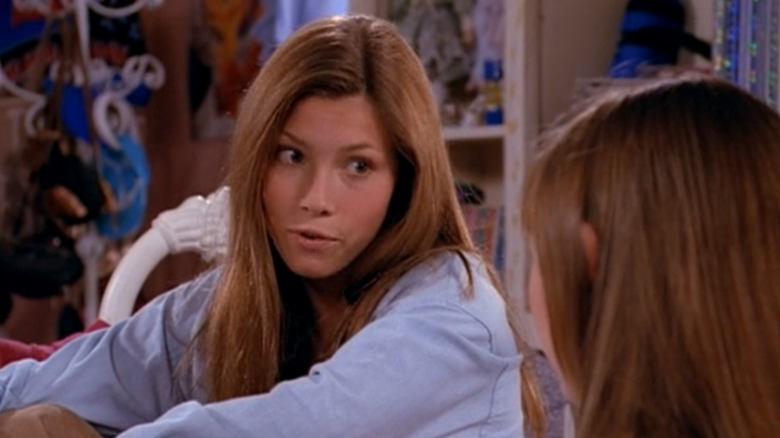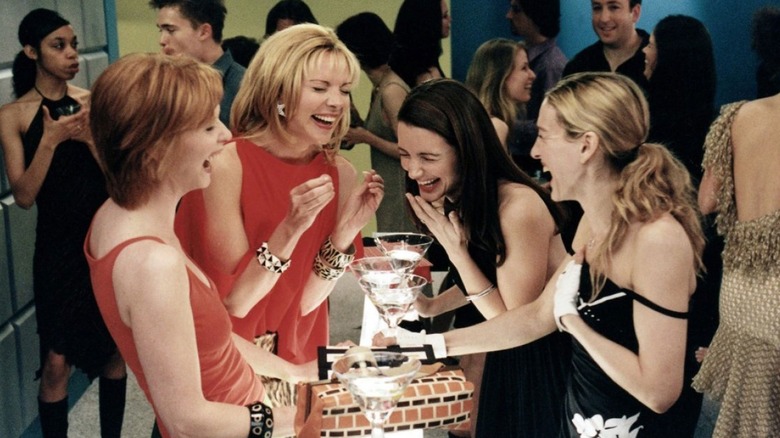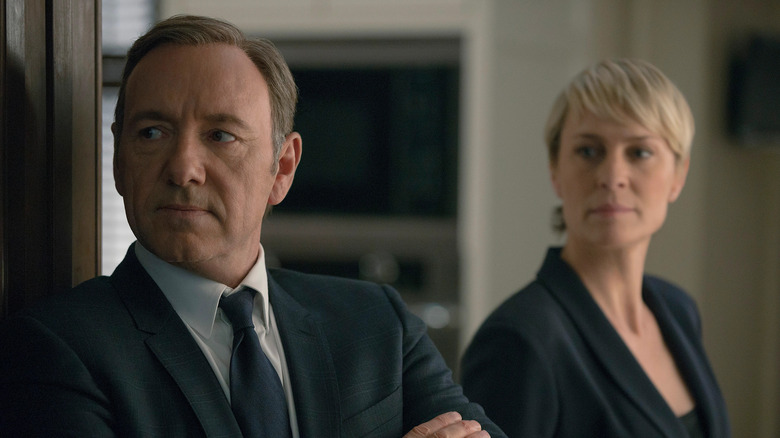TV Shows That Have Become Unwatchable With Age
As society and culture develop and move forward, it's pretty common for folks to look back at things they loved and enjoyed anywhere from five to 40 years ago. Nostalgia allows us the safety of knowledge. When we look back at things we've already experienced and processed, we get to decide which pieces we want to embrace and we don't have to deal with the anxiety of not knowing how it'll turn out. This is especially true of books, movies, and television.
With the invention of streaming came the start of binge culture. Instead of finding old shows again (or for the first time) through random syndication on cable channels, viewers were able to watch most full television series from the past 30 or so years on demand and at their own pace. Binge culture is not just discovering and watching something new (or new to you) for the first time, it is also the process by which a viewer can rediscover an old favorite that they've seen before and can perhaps share with someone else.
Stories will always be beloved to people for a million different reasons, but that doesn't mean that they will remain as relevant and palatable as they were when folks were first enjoying them. We've taken the liberty of assembling a few TV shows that haven't aged so well, for whatever reason, and that require any contemporary viewer to take them in with more than a few grains of salt.
Doctor Who (the original series)
Before you get too upset, let's be clear: we're talking about the original, pre-modern version of "Doctor Who." While much of the series' continuity and long-running themes were established during the days of William Hartnell, Tom Baker, and Jon Pertwee, it's difficult to sit through a three- or four-hour story arc with rubber monsters and a floundering Doctor. Sure, some of it has a bit of value for the ridiculous alien costumes alone, but for viewers accustomed to modern production values during an era in which television has risen to an art form, the camp and general plot holes make the show hard to endure.
Vintage "Doctor Who" barely stands up against the original "Star Trek" series, and that show features some serious, William Shatner-certified camp. Just sit down and watch "Time and the Rani," a particularly cringy episode from Season 24 of "Doctor Who." If you make it out alive, you've probably used up one of your regenerations.
Daria
Many kids of the '90s look back on their grungy years of sarcastic indifference with a bit of regret, but at the time, nothing was cooler than casual nihilism. Emblematic of that attitude was "Daria," the "Beavis and Butthead" spinoff that focused on the duo's smart, seemingly utterly disinterested classmate.
At the time, it was relatable animation for people who were stuck between childhood and adulthood. In retrospect, original fans of the show (who are now adults that have moved beyond a phase of forced, adolescent apathy) now know that Daria's unrelenting attitude was an obstacle to valuable life experiences, making it hard to watch today — not to mention that every other character in the show is obviously a terribly broad caricature of high school stereotypes.
It seemed so real at the time, but alas, that's the thing about getting older; you don't really realize you've done it until you look back at an earlier time and realize how many of your opinions have changed.
Scrubs
Despite being written anywhere from 10 to 20 years ago, many of the jokes from "Scrubs" have actually aged well, even though there was a huge emphasis on the objectification of women and homophobic jokes throughout most of the show. A lot of J.D.'s signature fantasy sequences often depicted daydream scenarios wherein the women in his life were depicted in hyper-sexualized situations. In one scene, fantasy Elliot performs a very risqué burlesque scene. In another, J.D. imagines what Elliot would look like if she were combined with Turk, and as a result, she appears onscreen in blackface giving J.D. permission to grope her.
At its best, "Scrubs" offered an entertaining comedy counterpoint to the glut of medical dramas on television. There was even a time when Zach Braff's Dr. John Dorian was a sympathetic character whose everyday trials and heart of bronze were worth watching ... but as the show progressed, Dorian became less and less likable, and less insightful during his endless monologues. Braff finally left the show partway through the ninth season, which was meant as a partial reboot of the show. Unfortunately, without the chemistry of its original cast, the updated "Scrubs" never reached Season 10.
Full House
If you were like most kids in the late '80s, you were probably parked in front of ABC's family-friendly "TGIF" block every Friday night. And your parents probably hated every second of it, because a little bit of Steve Urkel's insatiable lust for cheese goes a really, really long way — and the saccharine morality and terrible puns in "Full House" were always hard to stomach. "Full House" was popular when it came out, and it remained popular with kids long after it had been canceled, thanks to its syndication on ABC Family. But eventually it became too dated for viewers to vibe with either its politically out-of-touch characters and plots or its catchphrase-centered humor.
Audiences were reminded just how awkward and unfunny the original show was when a reboot, called "Fuller House," came to Netflix in 2016. Despite the fact that Netflix has come to be known for canceling many promising and critically lauded shows after one season, it chose to continue backing the massive cringe-fest that was "Fuller House" for five.
Married... with Children
Pushing against the borders of television decency was a pretty risky thing to do back in the days of "Married ... with Children," and no one pushed harder than Fox's original hit sitcom. That level of borderline-repulsive sass was something different in the '80s and '90s, but watching the exploits of Al Bundy and his dysfunctional family now, it's clear that the program was pretty much an equal mix of embarrassingly easy fat jokes and sex jokes ... and nothing else.
Seeing what stars Ed O'Neill, Katey Sagal, and Christina Applegate are truly capable of as actors later in their careers — in shows like "Modern Family," "Sons of Anarchy," and "Dead to Me" respectively — just makes the broad, lowbrow junk of "Married" more embarrassing to watch, even fully acknowledging the era in which the show was produced. While it has a place in TV history, it should probably just stay there.
How I Met Your Mother
It's a sitcom about a dad who keeps his kids on a couch for nine years while he tells them, in great detail, about all of his greatest sexual conquests. The show's titular question was barely even answered by the end of the series, and in retrospect, the circuitous non-conclusion to the story fatally undermines the replay value of "How I Met Your Mother" (the forced in-jokes and cloying humor don't help, either.)
It doesn't help that the show's most popular character, Barney Stinson, has aged even worse than the show itself, what with his incredibly harmful, demeaning, and dehumanizing behavior toward countless women throughout the run of the series. Between him and Ted, not a single woman came and went from that show without experiencing some kind of harm except for Lily, and that is only because she was with Marshall for basically the entire run of the show.
Hercules: The Legendary Journeys
It's really hard to imagine a time when "Hercules" was seriously considered a watchable TV show, but we have to grudgingly admit that a show able to keep an audience for six seasons can't be completely wrong. While the sword-and-sorcery adventure was one of the more popular syndicated TV shows of its era, its villain-of-the-week formula, grating soundtrack, and widespread overacting haven't withstood the test of time at all.
TV audiences have come to expect a sense of continuity in a multi-season TV show, but "Hercules" completely ignored the linear flow of time and just did whatever, whenever, including rewriting the characters' own stories multiple times without any regard for the past. Once you have Herc witnessing the birth of Jesus, you've gone too far. At least we had "Xena, Warrior Princess" to make things better ... and who needs a plot when you have Lucy Lawless?
Rugrats
It may be sacrilege to disparage any classic Nicktoon, but a show like "Rugrats," that once seemed like a clever look at the world through the eyes of infants, has lost a lot of its charm — not least because it's hard to look past the constant baby talk and the grossly negligent parents. But as with so many shows, there was something there that kept viewers coming back for nine long seasons, along with a series of movies, two spin-off series, a couple of specials, and a whole plethora of merchandise.
Angelica never gets the discipline she needs to straighten out, everyone just keeps on having more babies, and anyone could have guessed that Chuckie would still be just as awkward in the show's unnecessary 10th-anniversary continuation, "All Grown Up!" Until someone comes along to animate the characters as balding, overweight 30-somethings struggling with depression and mortgages, we should probably just stick with "Doug."
Highlander: The Series
Although the production value of "Highlander: The Series" was widely praised by critics at the time, television fantasy has come a long way since the 1990s. In an age when HBO spends as much as $10 million per episode to create "Game of Thrones" and audiences are used to seeing big screen quality on their TVs, the CBS show based on the film of the same name now looks terribly dated — and its problems go deeper than aesthetics.
What at that time seemed like a sprawling epic has revealed itself as little more than a series of formulaic hourlong confrontations, pitting Duncan MacLeod (clansman and pupil of his movie namesake Connor) against one disposable immortal after another. Worse still, British actor Adrian Paul's performance is nowhere near the bar established by Christopher Lambert in the 1986 movie, lacking the rough edges and cool wit of the original Highlander.
The A-Team
The dramatic increase in TV production budgets over recent years has led to audiences expecting a certain amount of realism, and this is especially true when it comes to violence. As series like "The Walking Dead," "Game of Thrones," and their offshoots have continued to push boundaries, shows made in the days before a man could reduce another man's head to bloody mush with a baseball bat on primetime television begin to look awfully tame. "
"The A-Team" falls under this umbrella, a show on which thousands of mags of ammo are used on a weekly basis and remarkably, nobody ever dies. The longer the show went, the more ridiculous it became, getting to the point that a helicopter crashing into a mountainside and falling to the ground in a fireball caused little more than a scratch. Re-watching "The A-Team" today is guaranteed to awaken a bloodlust that you probably didn't know you had.
Saved by the Bell
While '90s spinoffs "Saved by the Bell: The College Years" and "Saved by the Bell: The New Class" have always been nigh-on unwatchable, and a 2020 revival that ran for two seasons on Peacock garnered somewhat favorable reviews, that the original show was once considered essential children's television. Digging out the NBC high school sitcom for your kids to watch today isn't advisable, however, as many of the lessons are painfully dated.
The episode "The Mamas and the Papas" makes for particularly cringeworthy viewing, pairing the kids up in an effort to teach them about married life. The tone of the episode is summed up by A.C. Slater's definition of a "women's movement" (when she puts on something cute and moves into the kitchen). It also becomes apparent over the course of the show's four seasons that Zack Morris has a severe gambling problem, with every other episode involving Preppy making some kind of bet at the expense of his friends.
Xena: Warrior Princess
New Zealand-made cult series "Xena: Warrior Princess" is mainly remembered for the way it challenged female stereotypes and the discussions that raged over its supposedly lesbian subtext, though two aspects of the campy classic that largely escaped criticism at the time were its questionable production values and clumsy directing. This was always a show that asked you to suspend your belief for its duration, but watching it now, it's hard not to notice the multitude of reused extras and recycled sets.
The tonal shifts also take some readjusting, with moments of dark violence randomly giving way to full-on musical numbers that make less sense than the show's version of ancient Greece, which is inexplicably rife with American slang. While Aphrodite's Valley-girl persona used to feel like a welcome quirk in a show built around them, in reality it's just one of the many things about "Xena" that give it a distinctive B-movie feel.
Dawson's Creek
"Dawson's Creek" was part of the wave of teen films and TV shows that gushed out of Hollywood in the late '90s, created by the writer of the equally angst-ridden "Scream" movies, Kevin Williamson. The show had its detractors even when it was at the height of its popularity, though the torrent of criticism back then doesn't even come close to how hated this show would be if it aired for the first time today.
From its hammy dialogue and excessive self-regard to its habit of severely under-developing its female characters and being generally sexist, the only thing worse than "Dawson's Creek" as a show is Dawson himself, who's far more condescending and smug than you ever remembered. The only people who should be watching this today are millennials looking for a nostalgia fix — the VHS players, cropped tank tops, and watered-down ska music will have you reminiscing in no time.
Walker, Texas Ranger
The fact that Chuck Norris has become a living parody of this character is almost — but not quite — enough to prepare you for a return visit to the unapologetically patriotic "Walker, Texas Ranger." From the annoyingly catchy theme song "Eyes of a Ranger" (performed by Norris himself) to the one-dimensional, gravelly-voiced villains and the awkwardly staged fight scenes that invariably end with the star's trademark roundhouse kick, this show used to be so bad it was good. Now, it's just bad.
While Norris is clearly a skilled martial artist, he struggles with pretty much everything else asked of him here. He could be delivering a motivational speech to a class of schoolkids or doing something as simple as answering the phone — no matter what, he looks uncomfortable, itching to move past those pesky moments of dialogue and start beating the hell out of Texas one small-time crook at a time.
Mighty Morphin Power Rangers
While things certainly became less formulaic as the show went through its numerous reincarnations over the years, the monster-of-the-week format relied upon in "Mighty Morphin Power Rangers" meant that there was a constant lack of genuine adversity in those early days. Of course, there were the rare occasions on which the Rangers would lose their powers and find themselves in the odd dire situation, but generally speaking there was no problem that the Megazord couldn't easily solve.
One thing that becomes obvious when watching early "Power Rangers" episodes today is that the show wasn't made from scratch in Hollywood. The first season simply stole its fight sequences from the Japanese show "Kyouryuu Sentai Zyuranger (Dinosaur Squadron BeastRanger)" and hired American actors to fill in the gaps, a clever ploy from producers looking to make a buck in the U.S. market without having to spend money on big set pieces. It worked, even though it's painfully obvious that most of the actors couldn't pull off some of the stuff they managed to do behind their masks.
Baywatch
"Baywatch" existed in a time when the definition of steamy television was very different than what it is now, and that seems to be the only reason this show managed to survive for a full decade between 1989 and 1999. At its height, the California lifeguard drama was one of America's most highly coveted exports, commanding over a billion weekly viewers from over 148 countries at one point.
Looking back at the show today, it's plain to see that the skin routinely on display was literally the only appeal. With nowhere near enough drama to warrant an hourlong slot, "Baywatch" fills the gaps with copious amounts of running, normally presented in slow motion to not only capture the female cast's bouncing chests in all their glory, but to make up for the fact that there isn't much else going on. To be fair, critics at the time were well aware of the show's limitations, with the Washington Post describing it as "'Flipper' without the dolphin" in their preview.
Knight Rider
If you thought "Baywatch" was as dated as David Hasselhoff gets, think again. Even though that show's stars were basically well-toned bags of meat in tight red swimwear, they were still more interesting than KITT (Knight Industries Two Thousand), the talking car who served as the star of Hasselhoff's '80s sci-fi series "Knight Rider."
The artificially intelligent car simply doesn't make for a very compelling sidekick for the crimefighting Michael Knight, and the fact that "he's" a vehicle severely limits the show's plot opportunities. But at least the state-of-the-art special effects made up for it ... in the '80s. Even the most ardent consumer of the decade's nostalgia will have a hard time swallowing this today, but the premise itself may have reached its expiration date as well: despite attempts since 2002 to develop both a film adaptation and an updated Justin Lin-produced reboot series, KITT remains stored in the garage.
The Fresh Prince of Bel-Air
"The Fresh Prince of Bel-Air" still has a lot of interesting things to say about class division in the U.S., routinely touching on topics that even modern American sitcoms seem content to ignore. The trouble with the show as far as rewatchability is concerned isn't the message it sends, but rather the tact it takes in doing it. Formulaic to a fault, "The Fresh Prince" follows a painfully predictable pattern in which every episode is neatly wrapped up with a bow, invariably finishing with an important moral lesson for whichever character has gotten themselves into a misadventure that week.
Then there's the performance of Will Smith, which improved dramatically over the course of the show's six seasons, but left a lot to be desired in the beginning. Hired purely on the basis that he appeared affable, Smith was a rapper with almost no acting experience at the time, and it showed. The first season of the show appears particularly amateurish nowadays, with Smith visibly mouthing along with his co-stars' lines.
Sister, Sister
"Sister, Sister" is a '90s sitcom in the spirit of "The Parent Trap," made before Disney decided to reboot the 1961 film about twin sisters randomly reunited after being separated at birth. In this instance, Tia and Tamera bump into each other at a shopping mall and discover that one has it way better than the other, leading to both girls and Tia's mother Lisa moving in with Tamera's well-off dad Ray. The twins fight off advances from their neighbor Roger and get into all the scrapes you'd expect of teenage girls — which was all well and good at the time, but really doesn't resonate today.
Those who grew up watching "Sister, Sister" are now adults, and re-watching the show now reveals how poorly constructed the grownups were. Single mother Lisa is a walking, talking stereotype and Ray is even more one-dimensional as the square widower. Their transparently constructed romantic subplot is randomly abandoned, making room for more car dates and adolescent anxieties.
Gossip Girl
When "Gossip Girl" came out on The CW in 2007, it was an instant phenomenon. While there had been plenty of teen-centered shows on television by that time, "Gossip Girl" was the first one of its kind that depicted teens with extreme wealth and independence in a New York City setting. People were obsessed with the style, romance, and of course, the dramatic gossip of all of the show's fictional teen protagonists (most of whom were played by actors in their 20s).
"Gossip Girl" didn't go off the air before making some questionable plot decisions (Blair and Dan, really?!) or revealing a truly nonsensical answer to the identity of the show's eponymous gossip-monger, so naturally it hasn't aged well into the present, either. It's particularly upsetting to watch the antics of Chuck Bass, knowing that his behavior toward most of the women in the show was, at least, criminal at one point or another, and that he will still score his happy ending with Blair. It also doesn't help that Ed Westwick, the actor who played Chuck, was accused of sexual violence by multiple women in 2017.
If you or anyone you know has been a victim of sexual assault, help is available. Visit the Rape, Abuse & Incest National Network website or contact RAINN's National Helpline at 1-800-656-HOPE (4673).
Grey's Anatomy
When it first premiered, "Grey's Anatomy" was one of the most critically lauded dramas on network television, having been nominated for best drama at the Emmys in both 2006 and 2007 and for many different performances from its cast throughout its first six seasons on the air. The show jumpstarted the careers of Katherine Heigl, Sandra Oh, and Patrick Dempsey, and set up Shonda Rhimes as one of the most influential producers in television.
"Grey's Anatomy" is technically still on the air, but only three characters remain from the show's original cast. Sandra Oh has continued to find critical success on shows like "Killing Eve," but Heigl and Dempsey have fallen far from the public eye since their own respective exits from the show. Shonda Rhimes produced other hit shows such as "Scandal" and "How to Get Away with Murder" before moving on to a production deal with Netflix.
It's hard to go back and rewatch "Grey's Anatomy" from the beginning because the show went from being a relatively subversive medical drama to a primetime soap in which all of its characters have suffered through countless horrific tragedies and deaths. So many of the characters you found yourself rooting for in the early seasons are just dead and/or gone for good in the show's current timeline, and it's a huge bummer to watch while knowing how their stories end.
The West Wing
There was a time when the political operatives depicted in Aaron Sorkin's White House drama, "The West Wing," were considered to be about as far left and progressive as any presidential administration could hope to be. Jed Bartlett was the perfect president: brilliant, kindhearted, open-minded, and driven by a desire to do good for his country and the world. He wasn't driven by a desire for power or personal glory, and neither were his senior staff members (for the most part).
Nowadays, it's difficult to watch "The West Wing" without feeling like it was made with a fair amount of naiveté. There's a lot of optimism about the American legal system, governmental structure, and economic policy that has gone by the wayside since the show ended. What's more, it's strange to see the main characters of the show occasionally deal with people who are even more progressive than themselves when the beliefs and goals of those radical leftists have become more mainstream in contemporary politics.
The show ends with a presidential election between a liberal Democrat and a moderate Republican, and it's painful to watch two qualified, mostly upstanding people run for president after seeing how extremely divided the two parties have become in the years since.
Pretty Little Liars
"Pretty Little Liars" spent its seven seasons seeking to answer the same question over and over again: who is A? The thing is, you can only center a show around an anonymous person endlessly and viciously terrorizing four teenage girls for so long before it just doesn't make sense that they've not yet been unmasked. There ended up being three different answers to that question throughout the series, along with about 50 red herrings indicating other characters along the way. The story became so convoluted that it was almost impossible to follow as the show was airing. To go back for a rewatch would be an exercise in masochism.
One of the other reasons "Pretty Little Liars" is so hard to watch these days is the heavily romanticized relationship between one of the main protagonists, Aria (a 17-year-old junior in high school) and her English teacher, Ezra. That's right, the show presented a romantic relationship between a high school student and her teacher as something to root for. Aria wasn't the only underage girl getting involved with men in their 20s, either: Alison, Spencer, and Hanna all engaged in some level of romance with men at least four years older than them. The ick factor is large.
Glee
Ever since the overdose death of "Glee" actor Cory Monteith, who played one of the lead protagonists, Finn, people have speculated whether or not the cast of Ryan Murphy's sardonic musical high school TV show might be cursed. There's even been a documentary that explored the curse.
Since Monteith's death, two more of his costars have passed away. Mark Salling, who played Puck on "Glee," was arrested for some nasty business in 2015 and died by suicide in 2018 following a guilty plea in court. Naya Rivera, who played Santana, died of accidental drowning when she went out swimming with her son in 2020. It's chilling to go back and watch all three of them act as singing teenagers, knowing what will happen to them in just a few years — and in Salling's case, knowing what he may have been up to behind the scenes.
Potential curses aside, the likability of several of the main characters and cast of "Glee" has plummeted. Matthew Morrison and his "Glee" character, Mr. Schue, are widely hated across the internet and Lea Michele has been outed as a terrible costar, with one person saying, according to The Daily Beast, "She's a cancer on humanity."
If you or anyone you know needs help with addiction issues, help is available. Visit the Substance Abuse and Mental Health Services Administration website or contact SAMHSA's National Helpline at 1-800-662-HELP (4357).
If you or anyone you know is having suicidal thoughts, please call the National Suicide Prevention Lifeline by dialing 988 or by calling 1-800-273-TALK (8255).
Friends
"Friends" is one of the most popular sitcoms ever made. Network executives and producers have been trying to recreate its magic ever since it became a phenomenon around its second season. But they've never quite managed to replicate its monumental success, despite the fact that the premise isn't too complicated. It's a show about six attractive, white 20-somethings living together in New York City. Not only can it never be replicated, it also can't even be watched anew.
The show was always well-written, and plenty of its jokes are evergreen (who could forget Joey's "moo point" from Season 7 or Ross's desperate shouting of "PIVOT!" from Season 5?), but a lot of its humor is dependent on fat jokes and homophobia. Courteney Cox donned an unconvincing fat suit every time her character, Monica, was depicted in a flashback, and the snarky quips about her weight (both in the flashbacks and years after her weight loss) are frankly vicious.
The show denied its male characters the ability to display any qualities that could be considered remotely feminine without getting roasted for their sexuality, and the way that it addressed the gender expression of Chandler's father is not easy to watch through a contemporary lens. At the time of its airing, "Friends" may have been considered progressive, but nowadays it's almost impossible to watch without cringing.
America's Next Top Model
Tyra Banks had a reality show in the 2000s called "America's Next Top Model," and rewatching it feels like experiencing a fever dream. There were not one, but two photo shoots throughout the course of the show in which the contestants were each made up to look like they were of a different ethnicity; one was a "Got Milk?" ad in Cycle 4 and the other was a "bi-racial" photoshoot in Hawaii in Cycle 13. Banks has since defended the artistic premise of the shoots, claiming that people only saw news reports about them and didn't understand what they were trying to do.
Every cycle of models also went through a set of makeovers, ranging from a little trim to getting their hair shaved off. Some models were forced to get extraordinarily painful hair weaves and extensions, while Banks even arranged for the winner of Cycle 6, Dani, to get a gap in her teeth closed by a dental surgeon.
Every season saw at least a few photo shoots that better resembled challenges from "Fear Factor" than any high fashion editorial campaigns. It's especially difficult to watch the contestants go through so much trauma, now knowing that the rest of the fashion industry rarely took the show's winners and finalists seriously, according to Cycle 7 winner CariDee English.
That 70s Show
Like most of the other sitcoms on this list, "That 70s Show" can still garner quite a few chuckles. Red and Kitty are still so much fun to watch, and the cultural references are interesting — the show really does feel like a time capsule. Unfortunately, "That 70s Show" was made in the '90s and '00s, and a lot of its humor hasn't aged well. Fez and Kelso are both pretty horrible to Donna, Jackie, and all of the other women on the show around their age, while Eric and Hyde are only marginally better. For example, there's a longstanding joke on the show where Kelso and Fez constantly attempt to walk in on Donna and/or Jackie while they're changing, sleeping, or getting intimate. Creepy.
Netflix recently released a spin-off called "That 90s Show," which follows the daughter of Eric and Donna as she spends her summer amongst new friends in Point Place while staying with Red and Kitty. It's a fun little show and worth keeping an eye on, but Hyde's absence also left us with a sad reminder of the real-life controversy surrounding Danny Masterson (who played Hyde on the original show) and allegations of sexual misconduct that have been made against him (via US Weekly). Yet another character that it's a little bit difficult to root for in hindsight.
If you or anyone you know has been a victim of sexual assault, help is available. Visit the Rape, Abuse & Incest National Network website or contact RAINN's National Helpline at 1-800-656-HOPE (4673).
7th Heaven
"7th Heaven" was a weirdly popular show considering how corny it was. The program followed a minister named Eric Camden, his wife and his five kids; Matt, Mary, Lucy, Simon, and Ruth. Aside from the fact that "7th Heaven" is very clumsy and not very nuanced Christian propaganda, it's also bizarre. Watching "7th Heaven" now feels like watching a period television show made hundreds of years in the future — as if someone found an early 21st century American minister's diary and filled in the blanks with some guesses about what people might have been like back then.
At one point, Mary asks her older brother Matt to help her learn how to kiss by practicing with each other, and they actually almost do it until Eric interrupts them. In another episode, Annie Camden, Eric's wife, shamefully admits that she once smoked marijuana. Annie also has an actual jump scare moment when she sees Simon give two middle fingers to his friends outside of school. The way that this show treats anything perceived as a "character flaw" like a grave sin is horrifying, and it's hard to believe so many of us watched this show so casually as kids.
Also, the actor who played Reverend Camden, Stephen Collins, has, in the years since the show went off the air, admitted to sexually abusing three girls (via The Washington Post).
If you or anyone you know has been a victim of sexual assault, help is available. Visit the Rape, Abuse & Incest National Network website or contact RAINN's National Helpline at 1-800-656-HOPE (4673).
Sex and the City
"Sex and the City," like many of the shows on this list, was fairly progressive when it aired. There hadn't been such a liberal depiction of women and their sex lives on television before "SATC," and it explored those sex lives in great depth and detail. Unfortunately, these days "SATC" is more remembered for its obnoxious main character, Carrie, some of her hot takes on things like bisexuality ("just a layover on the way to gay town" for men and an "experimental phase" for straight women), and many "Sex and the City" moments that didn't age well.
"Sex and the City" also goes out of its way to body-shame women wherever possible, and all four of the show's leading ladies — Carrie, Samantha, Charlotte, and Miranda — are often unnecessarily venomous in their judgments of each other and everyone around them. "Sex and the City" was recently rebooted as "And Just Like That...", sans Kim Cattrall's Samantha, and had the potential to bring "SATC" into the 2020s. But Charlotte and Carrie are both so rude to Miranda about her coming out of the closet that it doesn't seem to be very updated at all.
House of Cards
Obviously, a big part of what makes "House of Cards" so difficult to watch now is Kevin Spacey. Spacey was famously exposed as a sexual predator in 2017 when an actor named Anthony Rapp came forward about an incident that occurred when he was 14 years old. After Rapp, many others came forward as well, and it became clear that Spacey had been hurting a lot of people for a long time. "House of Cards" finished up its last season without Spacey, but it doesn't change the fact that he's the central figure of the first five.
Aside from that, "House of Cards" is sort of ... irrelevant. So much of the show's plot and intrigue depended on the morally dubious things that politicians like Frank Underwood will do in order to prevent the public from finding out about the skeletons in their closets. Turns out, people can still be elected to Congress and the presidency regardless of their many misdeeds.
If you or anyone you know has been a victim of sexual assault, help is available. Visit the Rape, Abuse & Incest National Network website or contact RAINN's National Helpline at 1-800-656-HOPE (4673).
